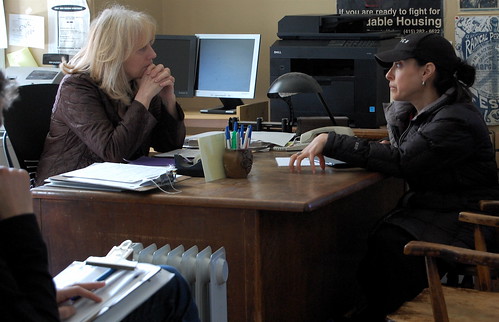San Francisco is one of the most expensive housing markets in the country. The limited supply of rental units coupled with a recent influx of wealthy tech professionals vying for those units has led some landlords to use unscrupulous methods to try to get rid of tenants who enjoy relatively low rents.
“There was a landlord who owned a two-unit building and wanted to convert the units to condos,” said Ted Gullickson, director of the San Francisco Tenants Union. “He actually cut the support beams under the house, hoping the floor would collapse and he could get the tenants out.”
That’s where the SFTU comes in. The nonprofit, which is run out of a Victorian in the Mission District, has been offering counseling to troubled renters in San Francisco for more than 40 years.
“We’re trying to preserve affordable housing in this city for everyone,” said Gullickson. “We do that in two ways: We offer counseling, which has helped thousands of people who have questions about repairs or evictions, and we help craft policy legislation.”
Although San Francisco is home to some very progressive tenancy laws, intense competition for housing means many renters face harassment and illegal evictions from landlords hoping to capitalize on the city’s costly rental market.
“Our model here is self-help, which isn’t how your typical social service operates,” he said. “When people come in, we don’t open a file on them or anything; we provide them with information and sometimes a lawyer. It can be hard to gauge our results, but our feedback has been overwhelmingly positive.”
Students are often vulnerable to landlord harassment due to their inexperience in dealing with housing issues.
“Young people are often victimized by unscrupulous landlords because the landlords think that young people can be easily manipulated or harassed,” said Gullickson.
Senior citizens also are frequent victims of harassment, according to Chris Rivest, a philosophy major at SF State and volunteer counselor at the SFTU, because many of them enjoy low rents due to San Francisco’s rent control policies, which the SFTU also helped to reform.
“Seniors are probably the most vulnerable, because if they are in a rent-controlled apartment and they get evicted, they’ll have nowhere to go,” said Rivest. “There certainly isn’t anything they can afford in this city.”
Counseling at the SFTU is provided by a staff of more than 50 unpaid volunteers who can answer almost any question relating to San Francisco’s confusing housing laws.
“People come in with questions and get to sit down with real people, for as long as they need to,” said Chris Ferguson, a health education major at SF State and intern at the SFTU. “It’s great to see the information get relayed to people and the sense of empowerment it gives them.”
Patricia Bossler, an Alamo Square resident for the past 22 years, turned to the Tenants Union when her landlord served her with an illegal three-day eviction notice.
“It was fantastically nerve-wracking,” Bossler said. “I had become a member (of the Tenants Union) and I had their book, which was a great resource. The book lays out what’s legal and what isn’t from the tenant’s point of view.”

Counselors from the SFTU eventually referred Bossler to the Eviction Defense Collaborative, who helped guide her through the mediation process, during which her landlord dropped the case.
“It can be a little inconsistent because some counselors aren’t as aggressive as others, but it’s a wonderful nonprofit. If you need help for free, they’ll give you help for free,” she said.
Becca Gourevitch, who coordinates volunteer efforts of the SFTU, said the volunteers are thoroughly prepared and have a wide range of expertise.
“We have a pretty rigorous training process for our volunteers. They usually train for six months to a year,” said Gourevitch, who is one of two paid staff members. “Many of our volunteers have been with us for years, and a lot of them are lawyers.”
Many renters who come to the SFTU end up becoming members, which entitles them to free counseling for a year, access to over-the-phone counseling and an all-inclusive tenant’s rights handbook. Membership ranges from $25 for low-income tenants, to $55 for middle-income households.
Tenants with mid-level incomes are asked to pay a $20 fee for drop-in counseling services. Those with low-incomes are offered a discounted rate of $10 per visit, though Gourevitch stressed that incomes are not verified and nobody gets turned away if they can’t afford to pay.
“We have different rates for low, medium and high income, but we don’t verify that kind of stuff,” Gourevitch said. “We don’t turn anyone away. We’re able to do what we do because of our volunteer staff.”
Beyond offering counseling to troubled tenants, the SFTU also plays an active role in crafting pro-tenant legislation.
“In the ’90s we helped get rent increases tied to inflation,” said Gullickson. “It’s saved San Francisco renters literally billions of dollars. There are around 200,000 units in this city and the average rent is around $2,000. If you add all that up, it’s a lot of money.”







PB • Mar 19, 2012 at 9:13 pm
Thanks for quoting me accurately. Your article is well-written and informative.